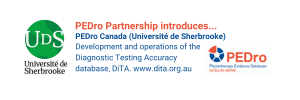Earlier this year the PEDro Steering committee announced the global expansion of the PEDro and DiTA databases and launched the PEDro satellite centres. The four satellite centres that are currently contributing to the maintenance of the PEDro and DITA databases are PEDro Canada (Université de Sherbrooke), PEDro Norway, PEDro Brazil, PEDro Singapore. The PEDro Steering Committee is grateful for these satellite centres and all volunteers involved.
This month PEDro introduces PEDro Canada (Université de Sherbrooke) and the key people working in the satellite centre.
Who are the key people in your PEDro satellite, and what organisation/s are represented by your satellite?
Yannick Tousignant-Laflamme, Simon Décary, Christian Longtin at University of Sherbrooke, Quebec, Canada

What is the role of PEDro Canada (Université de Sherbrooke) within PEDro?
PEDro Canada aims to continuously update (living systematic review) of the Diagnostic Test Accuracy database (DiTA). Through a monthly update of the scientific literature, DiTA indexes primary studies and systematic reviews of diagnostic test accuracy studies related to physiotherapy practice.
How did your satellite form?
The PEDro Canada satellite centre was formed after members from PEDro approached us to see if we would be interesting in contributing to the DiTA initiative based our expertise in conducting living systematic reviews. After some discussions, we quickly realized that we shared a common vision for DiTA, and that we were able to contribute significantly to the sustainability and improvement of this project.
What are the benefits of being a satellite for PEDro?
Being a satellite member for PEDro means that we can benefit from the great visibility of PEDro and their dissemination platform which is comprises of active social medias accounts that have reach to a large international audience. Furthermore, as a satellite member of PEDro, we can benefit from their expertise in knowledge mobilization based on their vast experience. This will prove useful in developing new initiatives.
What are potential areas of development for PEDro Canada (Université de Sherbrooke)?
In addition to maintaining the continuous update of DiTA, we also plan to expand this review process to include studies pertaining to prognostic models and create a repertoire of clinically useful prognostic tools and/or models (PiTA: Prognostic Tool dAtabase). We would conduct a living systematic review pertaining to the identification and appraisal of validated prognostic models that aim to predict health outcomes that are relevant to the rehabilitation of painful neuromusculoskeletal disorders. PiTA would be a knowledge mobilization hub to share the evidence with future users (clinicians/researchers/patients) and would potentially support the implementation of prognostic-related tools by clinicians across Canada and internationally.




